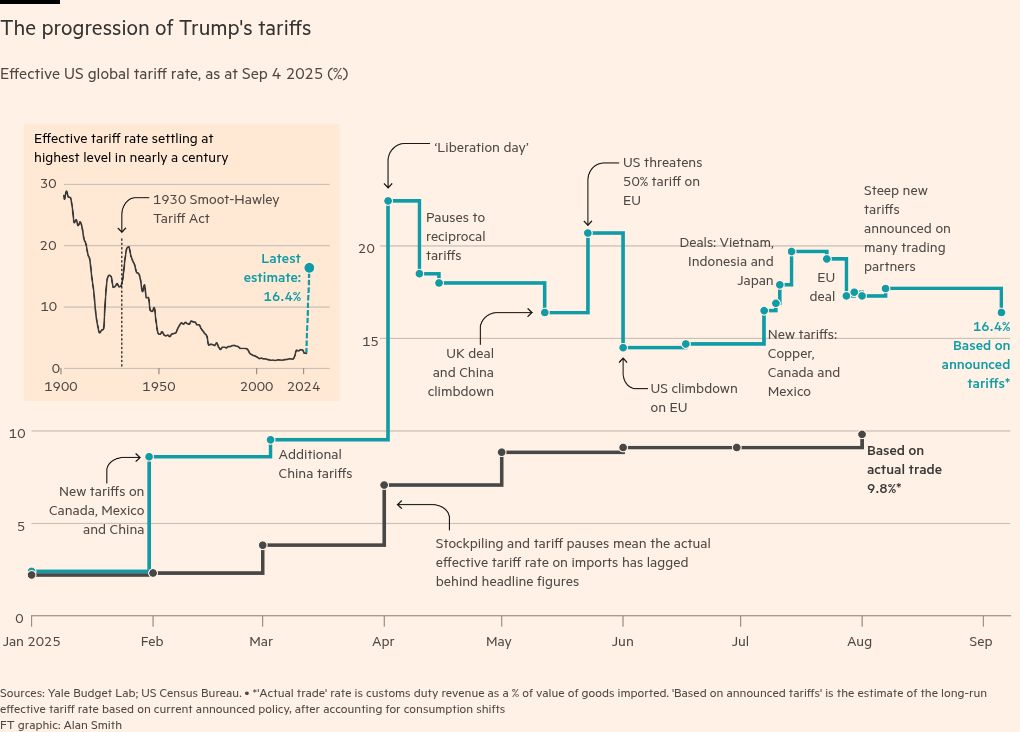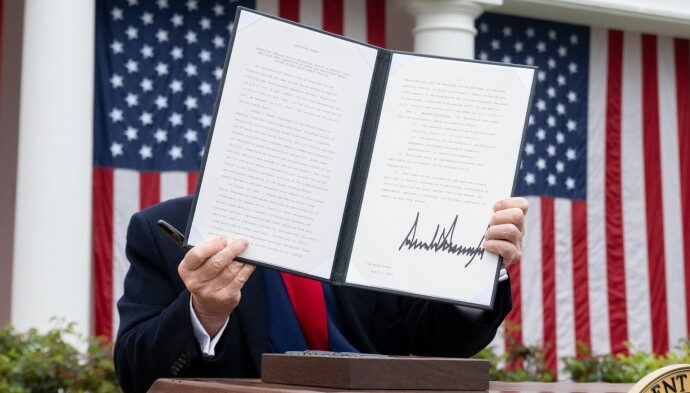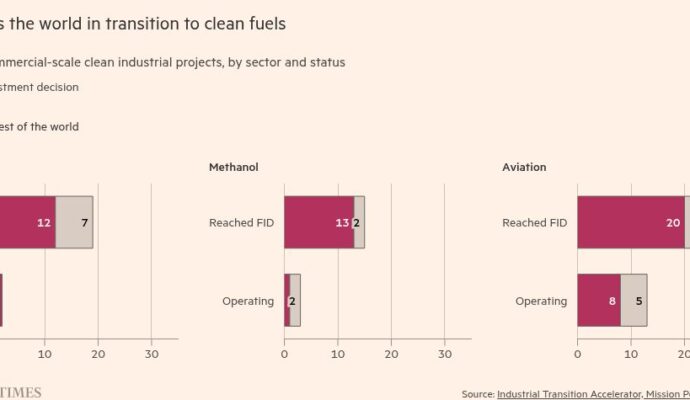Good morning. The benchmark stock indices in India have all been negative or flat most of this week, as scepticism over AI grips global markets. It’s hard to predict what the next positive trigger will be, but one must have hope, I suppose.
Meanwhile, polls have started in Bihar, and nothing gets Indians excited more than a good election. We will know the results next Friday. Will Nitish Kumar manage to hang on to his chair for five more years? Scroll down to see how this newsletter’s readers voted. He is not going to give up without a fight, that’s for sure.
KKR bets on India
Investment major KKR is looking at significant investments in India as part of its global expansion strategy. The firm’s co-chief executive, Scott Nuttall, who was visiting India this week, said the company was boosting investments in healthcare, financial services, consumer and technology businesses.
Significantly, Nuttall also said the firm was planning to use its insurance arm to fund transactions in India. In June, KKR financed $600mn in Bengaluru-based healthcare and education provider Manipal Group through its insurance subsidiary Global Atlantic. This was the company’s first Indian investment through Global Atlantic, which it fully acquired in 2023. The company is looking to expand the India business to resemble its global model — moving beyond buyouts and core investments into insurance capital solutions and other financial markets.
KKR has $9bn invested in various Indian entities, making it one of the largest private investors in the economy. The group’s optimism about India is not just based on projections of the country’s economic growth but also on account of the success of its investments. In 2022, it sold its holdings in Max Healthcare for $2bn, the largest market monetisation then by a PE investor in India. Earlier this year, it exited its holdings in JB Pharma for $1.4bn, netting fivefold returns. According to Nuttall, India and Japan are the best performing markets for the investment company in Asia, although he did not share specific numbers.
India’s share in private investments by large fund houses has been growing as China’s prospects have dipped. With slowing growth, geopolitical tensions and regulatory challenges, China is now far less attractive to foreign investors compared with a decade ago. Data from the Global Private Capital Association suggests that this year India has cornered a 41 per cent share of all private equity inflows into emerging and growth markets, beating China’s 34 per cent.
Much of this is thanks to the fact that New Delhi has rationalised the regulatory framework in many sectors. The central bank and the capital markets regulator have also loosened norms in order to welcome foreign investment. This is bearing fruit: net foreign direct investments were up more than 120 per cent in the April to August period this year compared with the same period last year. These numbers are especially impressive when contrasted with the fact that foreign portfolio investments are set for record outflows this year. A surge in patient money is some comfort in these difficult times.
Why do you think India is more attractive to FDI than FPI now? Hit reply or email me at indiabrief@ft.com
Recommended stories
Nvidia’s Jensen Huang says China “will win” the AI race with the US.
Putin signals Russia may start nuclear weapons tests in response to Trump.
Our latest visual investigation: how Saudi Arabia’s Neom dream unravelled.
AI pioneers claim human-level general intelligence is already here.
France will ban Shein.
What makes a bad book?
Mending fences
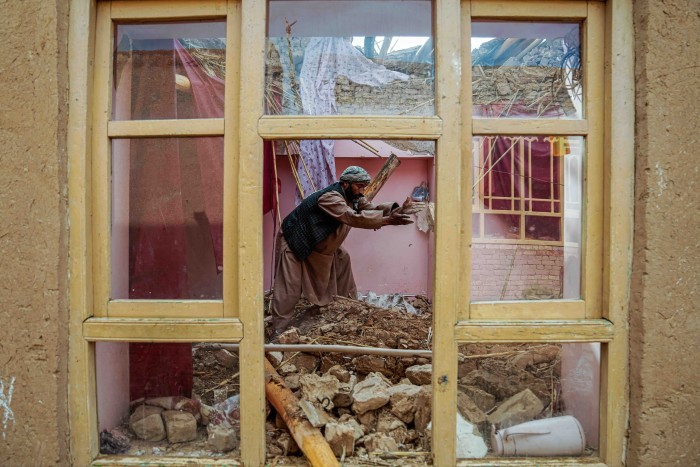
India is sending aid to Afghanistan after a 6.3 magnitude earthquake hit the country’s north on Monday. Foreign minister S Jaishankar was one of the first to call his counterpart in the Taliban administration to offer his condolences and assure them of New Delhi’s support.
These overtures come after Taliban foreign minister Amir Khan Mutaqi’s groundbreaking (and controversial) trip to New Delhi last month. This was the first visit to New Delhi by a senior Taliban official since the group’s takeover of Kabul in 2021. A few days later, India announced its intention to reopen its embassy in Kabul, which had been shut for four years.
In rushing to help its neighbour this week, India is trying to beat China to the punch as Afghanistan’s strategic significance in the region rises. For one, there is now a vacuum to fill after the Joe Biden-led US administration abruptly ended its engagement with the country, pulling troops and administrative resources in 2021. Secondly, India is desperately seeking allies in the region, especially after the military hostilities with Pakistan earlier this year. Afghanistan is an easy win in this regard, since Kabul’s relations with Islamabad too have significantly soured. The past few weeks have seen several clashes between the two countries on the border.
For more than a decade now China has been the region’s prominent benefactor, making big investments in all the countries in India’s immediate vicinity. But with the Trump administration shaking up geopolitical alliances all over the world, India too is looking at rewiring some of its friendships and alliances. With the Taliban, for example, India has done a full 180-degree turn from its former stance that there is no such thing as a good Taliban.
Earlier this week, a senior Indian official suggested to me that India’s strategic initiatives in foreign policy significantly revolve around being an important actor in the global south and in its commitment to the neighbourhood-first policy. Even though no one in the administration will concede to it, this does sound like a retreat from India’s aspirations to play in the big playground with western powers. Embracing the Taliban is only the first step in realigning equations in the region. There will be several others to follow.
Go figure
It’s been a year since Trump was elected to office for his second term. He has upended global trade, and despite his predilection to chicken out, the US’s de facto tariff rate is at its highest level in nearly a century.
Read, hear, watch
We did a fun thing yesterday, when Tee and I met a few of you — readers of this newsletter — for drinks at the Samuel Pepys pub near the FT’s headquarters in London. We had a fabulous time, hanging out and chatting with some wonderful people. Gossip and stories were shared, LinkedIn connections made and some warm new friendships initiated. I was especially pleased to see people brought together by India Business Briefing making plans to play tennis together! Thank you to everyone who came.


Buzzer round
What connects Johnnie Walker, Captain Morgan and Don Julio?
Send your answer to indiabrief@ft.com and check Tuesday’s newsletter to see if you were the first one to get it right.
Quick answer
On Tuesday we asked if sentiment against the incumbent will affect Nitish Kumar’s chances in Bihar? Here are the results. We will know for certain in a week.
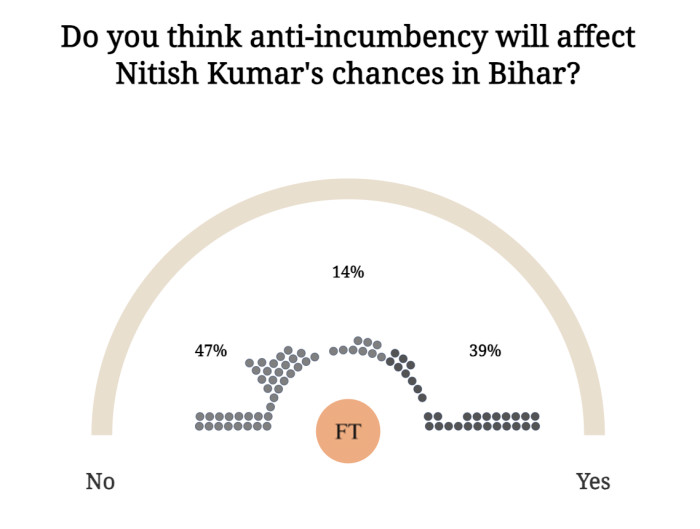
Thank you for reading. India Business Briefing is edited by Tee Zhuo. Please send feedback, suggestions (and gossip) to indiabrief@ft.com.
